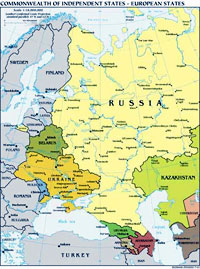BNE: Russian and Red Cross convoy leaves Moscow for Ukraine, bearing humanitarian aid

(Business New Europe – bne.eu – August 12, 2014) Russia in cooperation with the International Committee of the Red Cross (ICRC) will send a humanitarian convoy to Ukraine, President Vladimir Putin said in a telephone conversation with European Commission President Jose Manuel Barroso on Monday.
An enormous Russian convoy of about 280 trucks carrying humanitarian aid has left Moscow for southeastern Ukraine, Russian television and news agencies reported Tuesday.
Western leaders have been forced to accept the convoy but remain suspicious, accusing the Kremlin of trying to use it as a stealth method to invade its smaller neighbor with armed forces to support the besieged separatists in Donetsk and Luhansk.
Russian President Vladimir Putin and other senior Russian officials all insisted on Monday that it was a peaceful convoy coordinated with the International Committee of the Red Cross.
Specifically Putin accepted that there will be no military personal in support of the convoy. Tens of thousands of people have fled the fighting in eastern Ukraine and are camped out in tents just inside the Russian border with Ukraine.
Television pictures showed a long line of tractor-trailers stretched along a road. A Russian Orthodox priest was shown sprinkling the trucks with holy water before their departure.
Many of the vehicles were draped in huge banners reading “humanitarian aid” in Russian, along with the double-headed eagle of Russia and its white, blue and red flag.
Russia may see up to 1m Ukrainian refugees at once if Ukrainian special forces launch a full-scale assault on Donetsk and Luhansk, Russian Civil Chamber member Georgy Fyodorov said Monday.
“The biggest problem will arise, in my view, if a full-scale assault on Donetsk and Luhansk takes place. In the course of several days, we could get from 500,000 to onem people instantaneously crossing our border,” Fyodorov, the deputy head of the Russian Civic Chamber’s Committee for Coordination of Aid to Residents of Ukraine, said at a press conference at the Rossiya Segodnya news agency.
According to UN data, 730,000 people have left Ukraine for Russia since the beginning of the conflict between independence supporters and Kyiv’s Special Forces, but some may not have been registered, yet, Fyodorov said.
Russia’s Federal Migration Service said earlier in the day that it plans to close all temporary shelters for Ukrainian refugees by September 1 and arrange to transport them to the country’s regions.
Finland’s Foreign Minister Erkki Tuomioja is in constant contact with his colleagues from the United Nations (UN) and the Organization for Security and Co-operation in Europe (OSCE) in order to fulfil Russia’s plan to deliver humanitarian aid to Ukraine, Finland’s Yle television channel reported Monday.
“The situation in eastern Ukraine has not yet reached the scale of the [humanitarian] catastrophe in Gaza or Iran but still it is very serious,” Tuomioja said in an interview.
Tim Ash of Standard Bank said in a note:
Brilliant tactical PR move by Putin and by Russia. It also comes after the Putin’s brokered peace efforts in Sochi between Armenia and Azerbaijan over Nagorno-Karababh. Russia is trying to present itself as a regional peacebroker working towards peace and preventing a humanitarian catastrophe in Luhansk andÊDonetsk. The food import bans on Western countries are probably all part of this process, in trying to make Western countries think again about getting involved in this conflict, in aid of Ukraine, and pressurising the government in Kyiv to engage in negotiations with Moscow.
This was very hard for the government in Kyiv and the West to prevent given the difficult humanitarian situation on the ground for civilians on both Donetsk and Luhansk, plus ICRC support, alongside the Russian decision not to demand a military escort (at this stage at least).
For Russia this is a win-win, but creates potentially tricky scenarios for the government in Kyiv, especially if the on-going conflict on the ground halts the progress of the convoy, potentially creating negative international media coverage. This could prove to be Putin’s Gaza Flotilla in effect.
Russia will hope that the dispatch of this convoy creates momentum towards some form of international process to get the separatists and Russia back to the negotiating table with the government in Kyiv, halting the Ukrainian military’s continued advances in Donbas (they seem on the brink now of a victory) and over the longer term ensuring the delivery of Russia’s objectives in Ukraine. If the convoy gets stalled on the way by the military conflict, Russia might then feel the need to intervene more directly to extracate the 200-odd trucks and truck drivers, which would obviously mark another escalation.
Interestingly, commentary from Western leaders this morning remains very sceptical over
Russia’s motives and actions, with Australian, US and Polish officials sending a very similar message. The Poles are still arguing that Russia is looking for a pretext to invade Ukraine (similar to NATO comments yesterday), Australia seems to be looking to try and get Russia pulled out of the looming G20 summit in Australia and Chinese support to pressurise Russia to stop arms flows to separatists. Meanwhile, Kerry re-affirmed that the US thinks Russia supplied the kit which brought down the Malaysian airliner, while not ruling out further sanctions.
